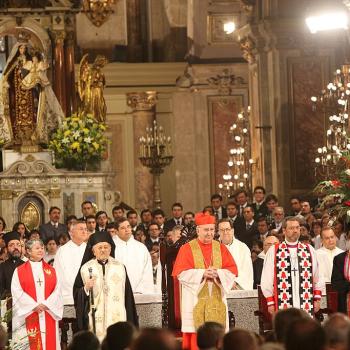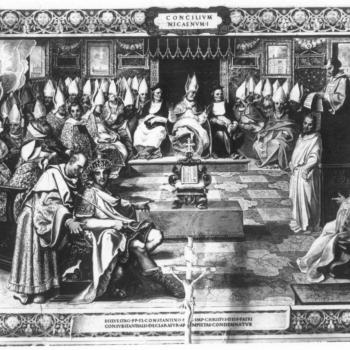
What people most often remember about ecumenical councils, if anything, are the dogmatic questions and debates which preceded them, and the authoritative responses the councils gave to those debates. Sadly, many do not know how to read the conciliar responses; they interpret them in a very literalistic fashion, thinking the letter of the text, as they interpret it long after the text was written, exhausts the meaning intended by the text itself, despite the fact that those involved in establishing those decrees, or those who in the immediate aftermath of a particular council wrote to explain and defend the conciliar decision, said otherwise. For the dogmatic decrees are meant to point to the truth, and as such, serve as conventions which help us apprehend it, but because they are written using human speech, it was generally agreed that the decrees could not serve as a comprehensive and exhaustive presentation of it. The point of the decree is more important than the words chosen because words can and do change meaning over time, which is why we must not feel as if we must enforce the world choices given at particular councils, but rather, the intention behind the words themselves, for if we did not, we would find ourselves in a bind as we try to understand the Council of Nicea, and its use of hypostasis, with other councils which use hypostasis in a radically different fashion. The most important element of the dogmatic definition is what is meant by the definition, not the word choice itself, though of course, understanding the meaning of particular words at the time in which the councils were convened will help us understand the meaning intended by those councils.
When the seventh ecumenical council (II Nicea) was convened, there was a debate going on as to whether or not Christians could (or were expected) to use holy images (icons, but also statues) in their worship, and the answer given by the council was a resounding yes. While this dogmatic concern is important, and, unlike many discussed at various councils, has an obvious practical application, we must not think the only thing done at II Nicea, or other ecumenical councils, was to promulgate some dogmatic decree. They were also concerned about how the church should be governed, and how to stamp out abuse when it was found in the church. To deal with those concerns, they created canons or ecclesiastical laws, which they hoped would set up the discipline the church needed to keep true to its mission. Through such canonical decrees, the church showed its ability to be flexible, to modify and change its rules when some proved to be no longer helpful, or worse, were capable of being abused, causing great confusion to the faithful. This is why we find some canons established at ecumenical councils have remained active and valid ever since they were promulgated, but others could and would be rescinded, which is why we must not assume a canon established at a particular ecumenical council remains in effect today.
Perhaps some of the most important canons from the councils are those which deal with the hierarchical structure of the church, explaining the various positions found in the hierarchy, who can hold such positions, and what is expected from those who do. When we study them, we can learn things, such as that women were ordained as deacons (as Chalcedon tells us). We can also learn how, over time, such hierarchical positions changed their function in society over time; at one time, many did not seek them out, but over time, many desired them because they saw the power they can wield by possessing them. This explains the rise of clericalism in the church, a problem which many canons at ecumenical councils tried to fix. Sadly, most solutions do not work for long. Either, the situation, and the kind of abuses, changes, or the canons themselves, while not being rescinded, slowly are ignored. This is why there is the need for constant reform in the church, with a specific focus of such reform to engage the threat of clericalism, and the many, devious ways it establishes itself in the church. We can see examples of this happening at II Nicea. For example, we can see it telling bishops they are not to take bribes (Canon 4), even as priests and bishops are told, via Canon 16, that they should glorify themselves with costly clothing, something which many priests, due to their new station in society:
All buffoonery and decking of the body ill becomes the priestly rank. Therefore those bishops and clerics who array themselves in gay and showy clothing ought to correct themselves, and if they do not amend they ought to be subjected to punishment. So likewise they who anoint themselves with perfumes. When the root of bitterness sprang up, there was poured into the Catholic Church the pollution of the heresy of the traducers of the Christians. And such as were defiled by it, not only detested the pictured images, but also set at naught all decorum, being exceedingly mad against those who lived gravely and religiously; so that in them was fulfilled that which is written, The service of God is abominable to the sinner. If therefore, any are found deriding those who are clad in poor and grave raiment, let them be corrected by punishment. For from early times every man in holy orders wore modest and grave clothing; and verily whatever is worn, not so much because of necessity, as for the sake of outward show, savours of dandyism, as says Basil the Great. Nor did anyone array himself in raiment embroidered with silk, nor put many colored ornaments on the border of his garments; for they had heard from the lips of God that “They that wear soft clothing are in kings’ houses.”[1]
Sadly, the spirit behind this canon seems to have been lost over time, especially after the renaissance, as we have seen the way many priests and bishops love to present themselves all decked out, hoping people will be in awe of them because of what they wear, and the authority it suggests, and not because of their character. This is especially true in regards the liturgical vestments some like to wear, vestments which are costly and larger than life, so that many people become enchanted by externals instead of the glory of Christ which transcends all externals. Similarly, Canon 10 of II Nicea dealt with the way some priests would like to move around from jurisdiction to jurisdiction for their own private interests:
Since certain of the clergy, misinterpreting the canonical constitutions, leave their own diocese and run into other dioceses, especially into this God-protected royal city, and take up their abode with princes, celebrating liturgies in their oratories, it is not permitted to receive such persons into any house or church without the license of their own Bishop and also that of the Bishop of Constantinople. And if any clerk shall do this without such license, and shall so continue, let him be deposed. With regard to those who have done this with the knowledge of the aforesaid Bishops, it is not lawful for them to undertake mundane and secular responsibilities, since this is forbidden by the sacred canons. And if anyone is discovered holding the office of those who are called Meizoteroi; let him either lay it down, or be deposed from the priesthood. Let him rather be the instructor of the children and others of the household, reading to them the Divine Scriptures, for to this end he received the priesthood.[2]
The spirit of the canons are important, because, even if the canons themselves are no longer followed, the principle which led to their establishment remains. Today, with the way many famous internet priests preside, not in the diocese of the bishop who ordained them, but elsewhere, acting almost as if they are independent from all authority, have caused great confusion to the laity, as they speak without having any authority to correct them. So, while there might be reasons for priests to be shared between dioceses, explaining why modification of canon law was necessary, the spirit behind this canon is important, as it works to undermine prideful priests who seek their own personal glory. Such priests are actively circumventing the spirit of the canons of the church. They should listen to the author of the book of Hebrews, who wrote: “Remember your leaders, those who spoke to you the word of God; consider the outcome of their life, and imitate their faith” (Heb. 13:7 RSV). While they might like to claim to be an authority, due to the ordination, and tells everyone to follow them, the reality is they do not possess such authority, and they should listen to their own authority, their bishop, even as they should look to the example of the saints of old and imitate the saints in their humility and resistance to clericalism.
The ecumenical councils give to us much more than dogmatic declarations as they give us a sense of the way the church should be guided; priests and bishops and others with positions of authority in the church, should not abuse their authority, nor seek to use it to prop themselves up in the public, to gain, that is, earthly glory thanks to their ecclesiastical position. For, if and when they use their authority their own personal benefit, they undermine the authority which has been given to them, for that authority is not for their own benefit, but rather, given to them so that they can better serve others out of love. Sadly, as church history shows, the church constantly finds itself having to deal with this problem again and again and again; let us look to and learn from the past, not expecting everything to remain the same, but to confirm to the spirit of the canons of old and use it to combat clericalism wherever it might arise. This way, the church can reform itself, and in its reform, it will be far more capable of fulfilling its role in the world.
[2] NPNF2(14):552.
Stay in touch! Like A Little Bit of Nothing on Facebook.
If you liked what you read, please consider sharing it with your friends and family!
N.B.: While I read comments to moderate them, I rarely respond to them. If I don’t respond to your comment directly, don’t assume I am unthankful for it. I appreciate it. But I want readers to feel free to ask questions, and hopefully, dialogue with each other. I have shared what I wanted to say, though some responses will get a brief reply by me, or, if I find it interesting and something I can engage fully, as the foundation for another post. I have had many posts inspired or improved upon thanks to my readers.













